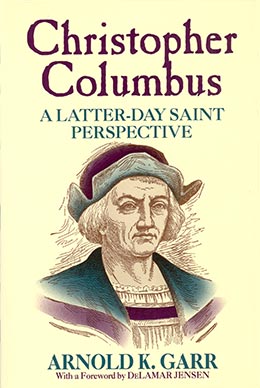Foreword
De Lamar Jensen
DeLamar Jensen, Foreword to Christopher Columbus A Latter-Day Saint Perspective, Arnold K. Garr, (Provo, Utah: Religious Studies Center, Brigham Young University, 1992), ix–xii.
In 1939 Charles Nowell observed in a brief book on the Age of Discovery, that Columbus is “alternately praised and belittled, groomed for canonization and charged with piracy, lauded as a scientist and branded as an ignoramus.” Little has changed in the ensuing 53 years, except that the negative evaluations have increased in both frequency and intensity. Why has it become so popular to excoriate a person who was once lauded as the most courageous, energetic, patient, pious, and persevering man ever born?
I suspect that part of the answer lies in the fact that human nature seems to delight in taking pot shots at anyone on a pedestal. Lesser figures can usually slip by unscathed, but people of prominence are always the targets of self-styled critics who find it easier to criticize than to analyze. The temptation is even greater when it is perceived that the subject under scrutiny is more exalted than seems appropriate. There is no doubt that Columbus was mythologized out of proportion in the late eighteenth and early nineteenth centuries by writers such as William Robertson, Charles Goodrich, and especially Washington Irving. Although well-meaning, these three succeeded in creating a mythical Columbus, a greater-than-life sized hero, who had all of the virtues and none of the vices of other mortals. This is the legendary figure whom Americans came to associate with the name Columbus, a man who always saw matters more clearly than anyone else, who alone thought the world was a sphere, against the contrary opinion of the most learned minds of Portugal and Spain, and who made no errors in his geographical and navigational decisions. Had it not been for his illicit love affair with Beatriz Enriquez de Arana, the Admiral would have been canonized in the 1880s.
It is not surprising that scholars have had problems with this nineteenth-century Columbus. He did in fact make many mistakes about geography and navigation. He was in error about the size of the earth, believing it to be much smaller than the majority of his contemporaries thought it was (they were right); and he grossly miscalculated the oceanic distance between the Canary Islands and Japan (Columbus-2400 miles—actual 10,600 miles).
The legitimate debunking of Columbus myths, however, has led to the invention of many new myths, some of which are more flagrant distortions of the truth and certainly more dangerous than the former ones. One of these is that reliable documents and information about Columbus are unavailable and therefore all we can do is conjecture, or fantasize. The fact is, there are a good many authentic and reliable documentary sources on Columbus’ life and thought. We don’t know everything about the man. There are many gaps, of course, and there are unsolved mysteries, but by and large there is about as much concrete data on Columbus as on any historical figure of 500 years ago, and a good deal more than on most of those who came from such an obscure background without formal education or social advantage. The problem with those who say Columbus is unknowable is that they do not use the sources readily available. They prefer their own conjectures to the drudgery of historical research.
Other, more pernicious, myths have resulted from the marriage of ignorance and perverted political agitation. Thus Columbus has been made the scapegoat for all kinds of contemporary causes, from being responsible for our present environmental pollution to being the evil force behind the exploitation and extermination of millions of native Americans. What these recriminations fail to take into account is that Columbus was not any more oblivious to the environment than were the rest of his contemporaries, or of those who preceded him, on either side of the Atlantic. Neither pollution, cruelty, slavery, nor social injustice began in 1492. These were all flourishing long before Columbus came on the scene.
The present study by Professor Arnold K. Garr does not address these or a great many other issues that confront both Columbus bashers and backers. It is not a polemical work trying to grind a particular political or social ax. Neither does it pause to argue the pros and cons of any number of issues that have been aroused in recent writings, nor go off on a tangent in pursuit of alternative interpretations of Columbus’ birth, nationality, or financial motives. It is, however, a book with a point of view. That point of view is Latter-day Saint, un-apologetic and undogmatic, characterizing Columbus as both a human being, with human feelings and flaws, and a man of God, with vision, conviction, and a pious devotion to the divine will. Columbus’ understanding of that divine will was limited by human frailties, yet he had enduring faith in God’s justice and mercy. Columbus believed further that he was divinely called to be an instrument in God’s hands to Christianize the islands of the ocean sea and to help redeem Jerusalem prior to the Second Coming of the Savior. All of this Professor Garr treats within the framework of the Book of Mormon prophecies as highlighted in modern ecclesiastical statements. It is a brief but sound study, relying on the best contemporary scholarship and a careful reading of both secular and religious sources.
De Lamar Jensen
Professor Emeritus of History and
Chairman of the Columbus Quincentennial Committee
Brigham Young University
